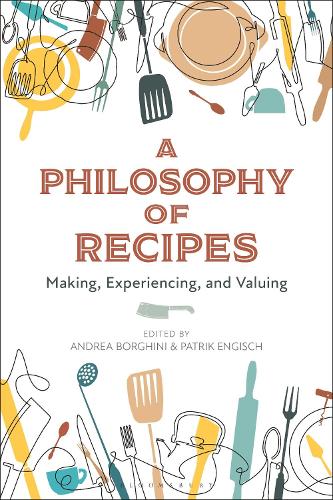
A Philosophy of Recipes: Making, Experiencing, and Valuing
(Hardback)
Available Formats
Publishing Details
A Philosophy of Recipes: Making, Experiencing, and Valuing
By (Author) Andrea Borghini
Edited by Patrik Engisch
Bloomsbury Publishing PLC
Bloomsbury Academic
13th January 2022
United Kingdom
Classifications
Tertiary Education
Non Fiction
Social and political philosophy
641.3/001
Physical Properties
Hardback
296
Width 156mm, Height 234mm
590g
Description
This volume addresses the nature and identity of recipes from a cross-disciplinary perspective. Contributors study the values and norms guiding the naming, production, and consumption of recipes, scrutinizing their relationship to territory, makers, eaters, and places of production. Along the road, they uncover the multifaceted conceptual and value-laden questions that a study of recipes raises regarding cultural appropriation and the interplay between aesthetics and ethics in recipe making. With contributors specializing in philosophy, law, anthropology, sociology, history, and other disciplines, this volume will be of vital importance for those looking to understand the complex nature of food and the way recipes have shaped culinary cultures throughout history.
Reviews
The philosophy of food is hot at the moment, but this book goes beyond the usual fare by suggestingand indeed demonstratingthat recipes should be an item of central philosophical concern. Cross-disciplinary but without losing philosophical focus, this collection argues that recipes reflect our metaphysical and ethical commitments in unique and profound ways. * Andrew Chignell, Laurance S. Rockefeller Professor in Religion, Philosophy, and the University Center for Human Values, Princeton University, USA *
A fascinating collection of essays that explore not only what recipes are, but also what recipes do, and how they mediate and shape our relationship to food and cooking. * Gyorgy Scrinis, Associate Professor of Food Politics and Policy, University of Melbourne, Australia and author of Nutritionism: The Science and Politics of Dietary Advice (2015). *
As more scholars recognize what rich sources recipes are for understanding human societies, this edited collection of meditations on the theme will be a very useful guide. The central question of how to think with recipes is answered beautifully and diversely here in a book that engages with all kinds of parameters, including law, cooking tools, and microbial motivations. * Megan Elias, Associate Professor of Gastronomy, Boston University, USA *
Author Bio
Andrea Borghini is Associate Professor of Philosophy at the University of Milan, Italy, and Director of Culinary Mind, Research Center for the Philosophy of Food based at the University of Milan, Italy. Patrik Engisch is adjunct lecturer at the University of Fribourg, Switzerland, and coordinator of Culinary Mind, Research Center for the Philosophy of Food based at the University of Milan, Italy.
